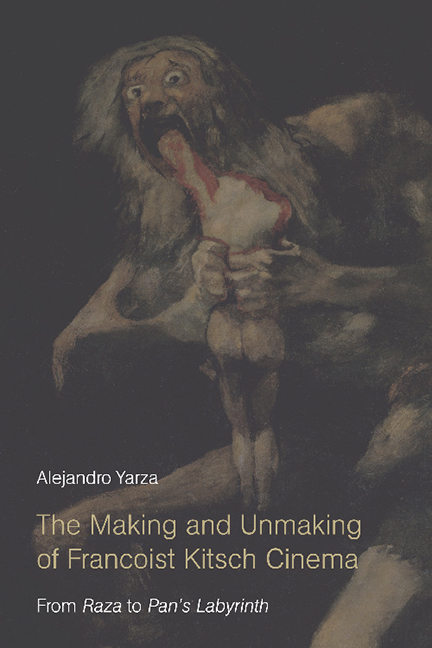Book contents
- Frontmatter
- Contents
- List of Figures
- Acknowledgments
- Preface
- Introduction
- 1 The Petrified Tears of General Franco: Kitsch and Fascism in José Luis Sáenz de Heredia’s Raza
- 2 Romancero Marroquí and the Francoist Kitsch Politics of Time
- 3 Los últimos de Filipinas: The Spatio-temporal Coordinates of Francoism
- 4 Surcos: Neorealism, Film Noir, and the Puppet Master
- 5 Franco, Ese Hombre: From Kitsch-Artist to Kitsch-Man
- 6 Viridiana: The World, the Flesh, and the Devil
- 7 Balada Triste De Trompeta: Of Ghosts and Clowns
- 8 Under the Sign of Saturn: The Labyrinth of Moral Choices in Francoist Spain
- Works Cited
- Index
2 - Romancero Marroquí and the Francoist Kitsch Politics of Time
Published online by Cambridge University Press: 10 November 2020
- Frontmatter
- Contents
- List of Figures
- Acknowledgments
- Preface
- Introduction
- 1 The Petrified Tears of General Franco: Kitsch and Fascism in José Luis Sáenz de Heredia’s Raza
- 2 Romancero Marroquí and the Francoist Kitsch Politics of Time
- 3 Los últimos de Filipinas: The Spatio-temporal Coordinates of Francoism
- 4 Surcos: Neorealism, Film Noir, and the Puppet Master
- 5 Franco, Ese Hombre: From Kitsch-Artist to Kitsch-Man
- 6 Viridiana: The World, the Flesh, and the Devil
- 7 Balada Triste De Trompeta: Of Ghosts and Clowns
- 8 Under the Sign of Saturn: The Labyrinth of Moral Choices in Francoist Spain
- Works Cited
- Index
Summary
When the rose garden of victory finally flourishes, we will give its best flowers to you
—Francisco Franco, to the Moroccan delegation in April 1937Romancero marroquí, a documentary about the Spanish Protectorate of Morocco co-directed by Carlos Velo and Enrique Domínguez-Rodiño and shot in 1938, three years earlier than Raza, aimed to achieve ideological hegemony in torn, Civil War Spain by means of its totalitarian kitsch aesthetic. A film with a clear political intent, Romancero was officially sponsored by Franco's provisional government (Elena 123). While in traditional colonial representations the colony becomes an alluring, albeit inferior, Other to the colonizing Metropolis in need of progress and civilization, in Romancero Spanish-Moroccan society becomes a model to be imitated, a kitsch paradise opposing—like Francoism itself—modern materialism and the secular state. By presumably offering Moroccans a highly favorable portrait of themselves, the Spanish High Commission in Morocco aimed to pay homage to the Moroccans who had already enlisted in Franco's colonial army and hoped to procure a constant flow of new recruits. Still, Romancero's creators wrongly presupposed a Moroccan audience that would positively respond to its kitschy message.
As it turned out, the idealized portrayal of the Spanish Protectorate offered by Romancero was rejected by high Moroccan officials, who objected to the film's depiction of Morocco as a picturesque yet backward country, and it was never dubbed into Arabic for its intended audience. It is my contention, however, that by depicting Moroccan peasants through biblical religious iconography, Romancero also aimed to convince Catholic conservative Spaniards of the moral legitimacy of deploying forty thousand Muslim “infidel” soldiers on Spanish soil to fight for Franco's crusade against Republicans.
Romancero's failure to reach its intended audience—and its two-sided agenda—provides valuable insights into the question of how the state-planned attempts to secure consent from the Spanish citizenry seem ultimately to have failed. Through this “failure,” the inner contradictions of Francoism were made clear: its lack of a unified social, political, and cultural agenda due to the vastly different political, economic, and ideological interests it tried to accommodate. In the cultural sphere, these contradictions were expressed most clearly in film legislation passed in 1941—such as compulsory dubbing—which almost single-handedly destroyed the Spanish film industry, seemingly undermining Franco's official cultural and political attempts to create a submissive Francoist subject.
- Type
- Chapter
- Information
- The Making and Unmaking of Francoist Kitsch CinemaFrom Raza to Pan's Labyrinth, pp. 42 - 59Publisher: Edinburgh University PressPrint publication year: 2017



